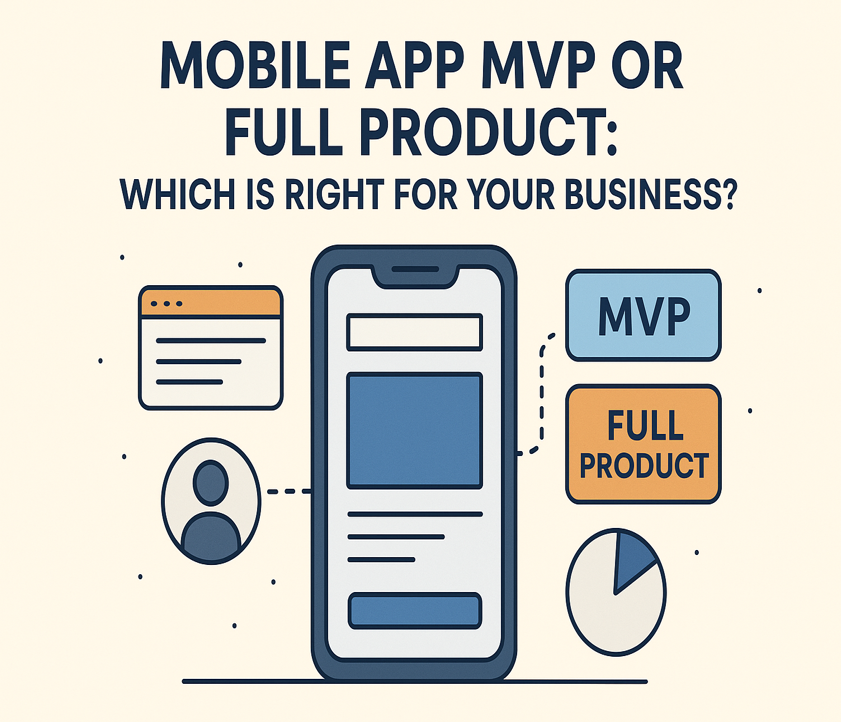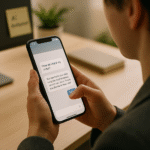Mobile App MVP: The Development Process

Choosing between a mobile app MVP and a full product is a critical decision for startups and businesses. The right approach depends on your goals, budget, and market conditions. At MVP Center, we specialize in MVP development strategies and full product solutions, guiding you to success with mobile app development trends, per SCNsoft.
What is a Mobile App MVP?
A mobile app MVP is a minimal version of your app with core app features to validate ideas and gather feedback. It focuses on solving a specific problem for early users.
Benefits:
- Quick market validation for MVP
- Reduced mobile app MVP cost
- Real-time user feedback for MVP
- Iterative improvements
- Example: Facebook’s MVP was a simple networking site for Harvard students, testing core app features before scaling.
What is a Full Product?
A full product is a feature-complete app with mature mobile app UI/UX design, robust architecture, and full integrations, ready for mainstream adoption.
When to Use:
- Idea already validated
- Competitive or regulated markets
- Strong financial backing
- Example: A ride-hailing app in Lagos competing with Uber needs full product development with in-app chat and payment systems.
MVP vs Full Product: Key Differences
| Aspect | Mobile App MVP | Full Product |
| Cost | Low (mobile app MVP cost) | High |
| Development Time | Short (weeks/months) | Long (months/years) |
| Features | Core app features only | Comprehensive feature set |
| User Feedback | Continuous via user feedback for MVP | Limited post-launch |
| Launch Speed | Quick for MVP development strategies | Delayed for perfection |
When to Use Mobile App MVP
Choose a mobile app MVP if:
- Testing an unproven idea
- Limited budget or timeline
- Seeking market validation for MVP
- Aiming for early investor interest
- Use Case: A health-tech startup launched a symptom checker MVP, using feedback to build a scalable app architecture for telehealth, per Intellias.
Advantages:
- Fast time-to-market for MVP
- Lower MVP cost
- Attracts early-stage investors
- Iterative user-centric MVP design
When to Go with a Full Product
Choose a full product if:
- Idea is validated
- Competing in a saturated market
- Industry requires compliance or trust
- Strong funding available
- Use Case: A fintech app launched a full product development with KYC and encryption to meet regulatory standards.
Advantages:
- Ready for mainstream adoption
- Competitive mobile app feature set
- Strong brand perception
- Fewer architectural changes
Hybrid Approach
A hybrid MVP approach balances MVP and full product benefits:
- Launch a lean MVP for a niche use case.
- Use user feedback for MVP to validate assumptions.
- Gradually scale to a full product development.
Benefits:
- Informs with real data
- Reduces MVP cost
- Enables iterative enhancements
Challenges:
- Requires disciplined scope management
- Needs clear roadmap planning
Final Thoughts
The choice between a MVP and a full product depends on your business goals:
- MVP: Low risk, high learning for startups testing new ideas.
- Full Product: High investment for established companies or regulated markets.
- Risk Insight: MVPs mitigate risk with time-to-market for MVP, while full products carry higher sunk costs if they fail.
When NOT to Use an MVP:
- Heavy regulations (e.g., fintech, healthcare)
- Public trust or reliability is critical
- Market demands a polished product
When NOT to Use a Full Product:
- Unvalidated concept
- Testing a new niche
- Limited budget or timeline
Get Started with MVP Center
Unsure about mobile app MVP vs full product? MVP Center offers expert MVP development services and full product solutions to:
- Test ideas with lean MVP development strategies
- Build scalable app architecture
- Deploy competitive apps Explore our Step-by-Step Guide to MVP Development and contact us for a free consultation to achieve startup app success!
Connect with MVP Center
Ready to take the first step towards unlocking opportunities, realizing goals, and embracing innovation? We're here and eager to connect.




